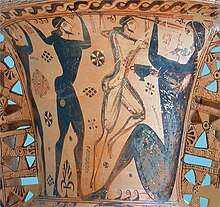Polyphemus
Jump to navigation
Jump to search
See also: polyphemus
Translingual
[edit]
Etymology
[edit](This etymology is missing or incomplete. Please add to it, or discuss it at the Etymology scriptorium.)
Proper noun
[edit]Polyphemus m
- A taxonomic genus within the family Polyphemidae – certain moths.
Hypernyms
[edit]- (genus): Eukaryota – superkingdom; Animalia – kingdom; Bilateria – subkingdom; Protostomia – infrakingdom; Ecdysozoa – superphylum; Arthropoda – phylum; Branchiopoda - class; Diplostraca - superorder; Onychopoda - order; Polyphemidae - family
Hyponyms
[edit]- (genus): Polyphemus exiguus, Polyphemus pediculus - species
References
[edit] Polyphemus (crustacean) on Wikipedia.Wikipedia
Polyphemus (crustacean) on Wikipedia.Wikipedia  Polyphemus on Wikispecies.Wikispecies
Polyphemus on Wikispecies.Wikispecies  Polyphemidae on Wikimedia Commons.Wikimedia Commons
Polyphemidae on Wikimedia Commons.Wikimedia Commons - Polyphemus available from http://www.irmng.org at VLIZ.03 Rees, T. (compiler) (2017). The Interim Register of Marine and Nonmarine Genera
- Polyphemus at World Register of Marine Species
English
[edit]
Etymology
[edit]From Latin Polyphēmus, from Ancient Greek Πολύφημος (Polúphēmos, from πολύ (polú) + φήμη (phḗmē) + -ος (-os), literally “many-voiced”, “much spoken of”, or “abounding in songs and legends”).
Pronunciation
[edit]Proper noun
[edit]Polyphemus
Translations
[edit]cyclops in Greek mythology
Latin
[edit]Alternative forms
[edit]- Polyphēmos (Greek-type)
Etymology
[edit]From Ancient Greek Πολύφημος (Polúphēmos, from πολύ (polú) + φήμη (phḗmē) + -ος (-os), literally “many-voiced”, “much spoken of”, or “abounding in songs and legends”).
Pronunciation
[edit]- (Classical Latin) IPA(key): /po.lyˈpʰeː.mus/, [pɔlʲʏˈpʰeːmʊs̠]
- (modern Italianate Ecclesiastical) IPA(key): /po.liˈfe.mus/, [poliˈfɛːmus]
Proper noun
[edit]Polyphēmus m sg (genitive Polyphēmī); second declension
- (Greek mythology) Polyphemus, the one-eyed Cyclops in Sicily, son of Neptune, who was blinded by Ulysses in Homer's Odyssey
- (Greek mythology) One of the Argonauts
- a male given name from Ancient Greek, equivalent to English Polyphemus or Polyphemos
Declension
[edit]Second-declension noun, singular only.
| Case | Singular |
|---|---|
| Nominative | Polyphēmus |
| Genitive | Polyphēmī |
| Dative | Polyphēmō |
| Accusative | Polyphēmum |
| Ablative | Polyphēmō |
| Vocative | Polyphēme |
Descendants
[edit]- → English: Polyphemus
- → French: Polyphème
- → Italian: Polifemo
- → Sicilian: Pulifimu
Further reading
[edit]- “Polyphemus”, in Charlton T. Lewis and Charles Short (1879) A Latin Dictionary, Oxford: Clarendon Press
- Polyphemus in Gaffiot, Félix (1934) Dictionnaire illustré latin-français, Hachette, page 1197.
- Polyphemus in Georges, Karl Ernst, Georges, Heinrich (1913–1918) Ausführliches lateinisch-deutsches Handwörterbuch, 8th edition, volume 2, Hahnsche Buchhandlung, column 1764
Categories:
- Translingual lemmas
- Translingual proper nouns
- mul:Taxonomic names (genus)
- English terms borrowed from Latin
- English terms derived from Latin
- English terms derived from Ancient Greek
- English 4-syllable words
- English terms with IPA pronunciation
- English lemmas
- English proper nouns
- English uncountable nouns
- en:Greek mythology
- Latin terms borrowed from Ancient Greek
- Latin terms derived from Ancient Greek
- Latin 4-syllable words
- Latin terms with IPA pronunciation
- Latin lemmas
- Latin proper nouns
- Latin second declension nouns
- Latin masculine nouns in the second declension
- Latin terms spelled with Y
- Latin masculine nouns
- la:Greek mythology
- Latin given names
- Latin male given names
- Latin male given names from Ancient Greek
- la:Ancient Greece
